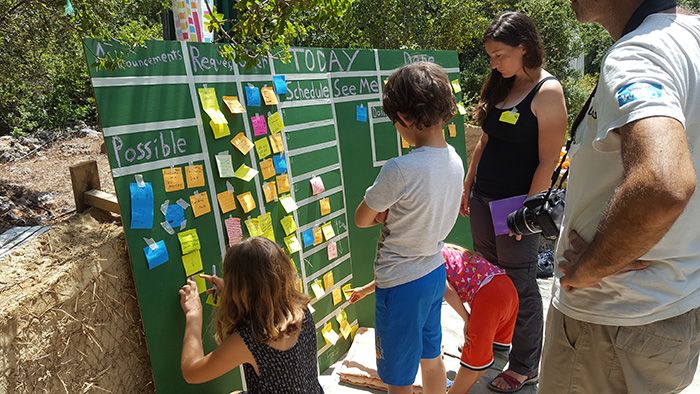‘Democratic Education’ does not have a singular, objective, or fixed meaning. ‘Democratic education’ is a term often used by Teachers, Academics, Educators, and, Policy-Makers which simultaneously can signify many different meanings, logics, understandings and practices.
Broadly speaking, ‘Democratic education’ can be understood as: “Education in which young people have the freedom to organize their daily activities, and in which there is equality and democratic decision-making among young people and adults,” to quote AERO’s (Alternative Education Resource Organization) Directory of Democratic Education.
Democratic education encompasses a broad range of theories, philosophies, pedagogies and educational practices. From the liberal progressivist theories of John Dewey; to communitarian and dialogical forms of democracy; to critical and/or anti-pedagogical approaches; to new technologies such as the gamification of learning.
Democratic schools are communities where Article 12 of the UN convention on the rights of the child, which states that children have a right to have a say on matters which affect them, is fully realised.

These learning communities, whatever they are, whoever they are for, are all unique from each other. They each populate their own place in the dome or spectrum of diversity within democratic education practice. And, in this individuality they all share the following elements:
We are told we live in a ‘democracy’. Yet, if there is little or no democracy in our schools how can we expect current and future generations to understand, practice, and, think about democracy in their societies. Democratic education seeks to empower young people and teachers through self-responsibility and democratic participation in schools whereby students learn to; speak their minds, fight for issues that are important to them, solve problems as a group, respect the opinions of others and contribute to developing their communities by establishing inclusive, communicative and cooperative pedagogies. Learning processes are thus harmonious and respectful as upholding the human rights of students and the human rights of teachers are of utmost importance in the classroom. In short, democratic education results in the development of reflective individuals who are collaborative problem-solvers and creative flexible thinkers. Just what the world of constant political turmoil and emergent technologies needs.
At the moment there are about 1000 schools around the world which call themselves democratic schools. The way democracy shows in these schools varies a lot starting from simple school meetings where students have a vote in certain issues to a complete democracy where students are involved in all decisions about their school including the budget, hiring and firing of teachers and the curriculum if there is any.
Democratic schools have been around since early 20th century staring from Summerhill school in England, which started in 1921 as a democratic boarding school, where lessons were optional. Another major school, Sudbury Valley School started in 1968 in Massachusettes, U.S. as a day school. Having no curriculum or no mandatory learning plans, grading or other structures usually found in schools, Sudbury Valley became another radical option. Only few schools have followed the boarding model of Summerhill, while several hundred schools have used the ideas of SVS or are more or less strictly based on the model.
Greek schools are considered as following and supporting democratic principles, even though there are rarely any democratic structures in them. The democracy in Greek schools is mainly based on the curriculum related to citizenship education, rather than on practicing it in the classroom and has limited association with an egalitarian relationship between teachers and students. Despite the state controlled educational pattern, a small number of Greek public schools manage to include some of the principles in everyday school life, mainly due to specific social circumstances that favour enlightening initiatives by dedicated educators.
Although the curriculum includes interdisciplinary approach and project based learning, in practice only a minority of schools implement this approach (mainly from the private sector) but there is no special emphasis on student participation in the actual process of co-creating the learning path. Students need to have a say in how they study and what they study. It is a priority issue for the Greek ombudsman for children, the establishment of direct active participation and respect of the opinion of all school children regarding issues that directly or indirectly affect their life.
A short, vivid taste from a Sudbury School
Greek Ombudsman for Children’s Rights
You cand send it to us using our contact form and if others have the same we will provide an answer here.
Well, no volunteers yet.. do you have one in mind?